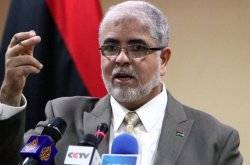Libya's Prime Minister-elect has nominated his cabinet for approval by the national congress, presenting a line-up that excludes the country's leading liberal coalition.
In a televised session on Wednesday, Mustafa Abushagur presented more than 20 government ministers, but said the post of foreign minister had yet to be filled and that he would act in that capacity for now.
The line-up is said to include several members of the political arm of the Muslim Brotherhood.
Abushagur, elected prime minister by the congress on September 12, did not nominate candidates from the National Forces Alliance (NFA), said Ibrahim al-Gharyani, head of the liberal coalition in congress.
Abushagur has said he wants to build a coalition government with a "geographical balance" in a country where regional rivalries are still rife.
His transitional government will take over from an interim administration in which he was deputy prime minister and which was appointed in November, following last year's overthrow of longtime ruler Muammar Gaddafi.
The congress will vote on the list name by name on Thursday and the appointees could still change. A spokesman said Abushagur could propose alternatives until Sunday if any choices are rejected.
Many of the names submitted are unknown and there is only one woman in the cabinet, who will hold the proposed social affairs portfolio.
Abushagur nominated Mabrouk Issa Abu Harroura, known to have worked for Libya's Zueitina Oil Company as well as in the oil sector abroad, as the new oil minister. Many industry officials had expected interim Oil Minister Abdulrahman Ben Yazza to stay in the job.
He also picked three deputy prime ministers - one from the western mountain town of Zintan, one from the south and the third from the east - in a move which could be seen to placate regional rivalries.
More details requested
Omar al-Aswad was nominated interior minister while Abdelsalam Jadallah al-Obeidi will be considered for the post of defense minister.
A former military officer from Benghazi, Obeidi defected early in last year's uprising against Gaddafi, who was killed in the rebellion that toppled his regime.
As finance minister, Abushagur named Abdallah Shamia, a former prisoner under Gaddafi when he was part of the then-underground Muslim Brotherhood movement in Libya. Shamia has taught economics at Benghazi university.
The NFA, led by wartime rebel prime minister Mahmoud Jibril, has 39 out of the 80 party seats in the 200-member assembly. The remaining 120 seats are in the hands of independents.
Hamuda Siala, spokesman for the NFA, said the coalition, which had called for nine ministries and the inclusion of its programme in the next government, would still support Abushagur's cabinet "as long as it aims to serve Libya's national interest, improve security and boost development".
Faisal al-Krekshi, previously NFA secretary-general, was nominated as health minister. Abushagur has kept several ministers from the interim administration, including Suleiman al-Sahli, the education minister.
Congress member Ahmed Mohammed Buni said some congress members were calling for more details about the candidates as so many were unknown.
"Abushagur said he would use standards of integrity, transparency when he presented his government line-up, but we haven't seen their CVs yet," he said.
As government chief, Abushagur will be responsible for the day-to-day running of Libya's oil-based economy while the national congress elected in July passes laws and helps draft a new constitution for the North African state. It will be put to a national referendum next year.
PHOTO CAPTION
Many of the names Mustafa Abushagur submitted are unknown and there is only one woman in the cabinet [EPA]
Aljazeera


 Home
Home Discover Islam
Discover Islam Quran Recitations
Quran Recitations Lectures
Lectures
 Fatwa
Fatwa Articles
Articles Fiqh
Fiqh E-Books
E-Books Boys & Girls
Boys & Girls  Hajj Rulings
Hajj Rulings Hajj Fatwas
Hajj Fatwas














